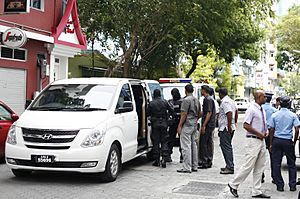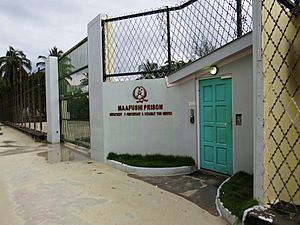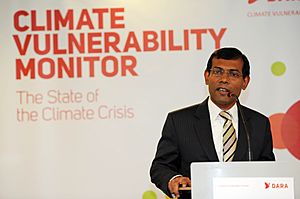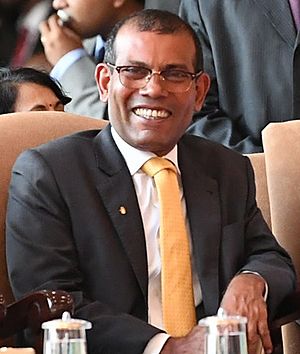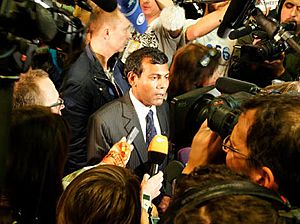Mohamed Nasheed facts for kids
Quick facts for kids
Mohamed Nasheed
|
|
|---|---|
|
މުހައްމަދު ނަޝީދު
|
|
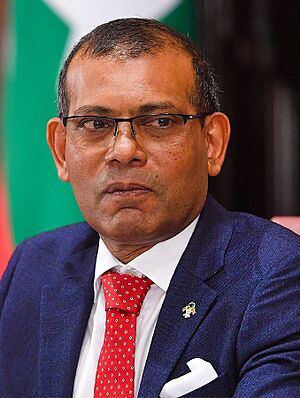
Nasheed in 2022
|
|
| 4th President of the Maldives | |
| In office 11 November 2008 – 7 February 2012 |
|
| Vice President | Mohamed Waheed Hassan |
| Preceded by | Maumoon Abdul Gayoom |
| Succeeded by | Mohamed Waheed Hassan |
| 19th Speaker of the People's Majlis | |
| In office 29 May 2019 – 13 November 2023 |
|
| President | Ibrahim Mohamed Solih |
| Deputy | Eva Abdulla |
| Preceded by | Qasim Ibrahim |
| Succeeded by | Mohamed Aslam |
| President of the Maldivian Democratic Party | |
| In office 30 August 2014 – 21 June 2023 |
|
| Vice President | Mohamed Shifaz |
| Preceded by | Ibrahim Didi |
| Succeeded by | Ibrahim Mohamed Solih |
| Member of the People's Majlis | |
| In office 28 May 2019 – 28 May 2024 |
|
| Preceded by | Constituency established |
| Succeeded by | Ahmed Xamyr |
| Constituency | Central Mahchangolhi |
| Personal details | |
| Born | 17 May 1967 Malé, Maldives |
| Political party | Maldivian Democratic Party (2003–2023; 2025–present) |
| Other political affiliations |
The Democrats (2023–2025) |
| Spouses |
Laila Ali Abdulla
(m. 1994; div. 2021)Yumna Rushdi
(m. 2024) |
| Children | 2 |
| Alma mater | Liverpool John Moores University |
| Religion | Islam |
| Signature | |
| Nickname | Anni |
Mohamed Nasheed (born 17 May 1967), also known as Anni, is a Maldivian politician and activist. He was the president of the Maldives from 2008 to 2012. He was also the 19th speaker of the People's Majlis (the Maldivian parliament) from May 2019 to November 2023.
Nasheed was the first president of the Maldives to be chosen by a democratic election. He is also the only president to have resigned from office. He is a founding member of the Maldivian Democratic Party.
Born in Malé, the capital of the Maldives, Nasheed studied abroad. When he returned, he became involved in political activism. He was elected to Parliament in 1999. However, he was later forced to leave his position. He was arrested and imprisoned many times early in his career. His arrest in 2005 led to public protests.
In the 2008 presidential election, he won 25% of the votes in the first round. He then defeated the president at the time, Maumoon Abdul Gayoom. Gayoom had been president for 30 years. As president, Nasheed helped bring international attention to the dangers of climate change for the Maldives.
On 7 February 2012, Nasheed resigned during a political crisis. This crisis began after he ordered the arrest of a judge. Police forces joined the protests against him. Nasheed said he was forced to resign. His successor, Mohamed Waheed Hassan, said the resignation was constitutional. An investigation by the United Nations and the Commonwealth of Nations found no evidence that Nasheed was forced out.
Nasheed ran for president again in 2013 but did not win. In 2015, he was found guilty of a charge related to the judge's arrest and was sentenced to 13 years in prison. Many groups, including Amnesty International, said this was politically motivated. In 2016, he received asylum in the United Kingdom. In 2018, the Supreme Court of the Maldives overturned his conviction. He returned to the Maldives and became Speaker of Parliament in 2019.
On 6 May 2021, there was an attempt to assassinate Nasheed near his home. He was seriously injured by a bomb. He received medical treatment in Germany and recovered. Maldivian authorities believe it was a terrorist attack by religious extremists.
Contents
Early Life and Activism
Mohamed Nasheed was born in Malé, Maldives, into a middle-class family. He went to school in the Maldives and then in Sri Lanka. In 1982, he moved to England for his high school education. After that, he studied maritime studies at Liverpool John Moores University and graduated in 1989.
His aunt, Lathee, was the first Maldivian to pass the University of Cambridge English exams. Her daughter, Ayesha Verrall, is a member of the New Zealand Parliament.
Nasheed became involved in political activism. He was imprisoned in 1991 for an article he wrote about the government. Amnesty International called him a "prisoner of conscience." He said he faced harsh conditions and unfair treatment while in prison. He was arrested many times during the rule of President Gayoom. During his time in jail, he studied a lot and wrote three books about Maldivian history.
Political Career
Becoming a Member of Parliament
In 1999, Nasheed was elected as a Member of Parliament for Malé. However, he was forced to leave his position due to charges that many believed were politically motivated. These charges involved taking "government property." Later, a leaked letter showed that he had only taken old files that were considered trash.
In 2003, Nasheed asked for a doctor to examine the body of a young prisoner who died in jail. An investigation showed the prisoner had been tortured. This led to public protests against the government. These events were a turning point in Maldivian history.
In November 2003, Nasheed left the Maldives. He helped create the Maldivian Democratic Party (MDP) while living in other countries. The British government recognized him as a political refugee in 2004. He returned to Malé in April 2005. He began promoting the MDP before it was officially recognized. Once the party was recognized in June 2005, he worked even harder to gain support.
In August 2005, Nasheed was arrested again during a protest. The government said he was detained for his "own safety." However, he was later charged with terrorism.
Presidency of the Maldives
The 2008 Election
In the 2008 presidential election, Nasheed ran for president with Mohamed Waheed Hassan as his vice president. This was the first time the Maldives had a multi-party presidential election where people voted directly. In the first round, Nasheed and Waheed came in second. They then won the second round against President Maumoon Abdul Gayoom.
Nasheed and Waheed became President and Vice President on 11 November 2008.
Cabinet and Policies
President Nasheed's first cabinet had 14 ministers. He created the first Islamic Ministry in the Maldives. However, some parties in his coalition later left the government. By the end of his first year, his cabinet mostly included ministers from his own party.
Nasheed focused on the threat of rising sea levels to the Maldives. In 2009, he promised to make the Maldives carbon-neutral within ten years. This meant using only wind and solar power. He said the cost would be similar to what the Maldives already spent on energy.
To raise awareness, Nasheed held the world's first underwater cabinet meeting in October 2009. The meeting participants wore scuba diving gear underwater. The next month, he started the Climate Vulnerable Forum. This group helps countries most affected by climate change.
Political Challenges and Resignation
In June 2010, Nasheed's cabinet ministers resigned. They said opposition members of parliament were making it impossible for them to do their jobs. Nasheed later reappointed them. However, in November, parliament voted to accept only five of the twelve ministers. This led to arguments between the ruling party and the opposition.
In December 2010, the Supreme Court of the Maldives ruled that the rejected ministers could not stay in their posts. Nasheed then appointed new ministers.
Less than a year into his presidency, some cabinet members resigned. They said there was a lack of transparency. Protests became common in Malé. In December 2011, an opposition alliance was formed.
On 23 December, there were large protests against Nasheed. A judge was arrested, which led to more protests. The Maldives Police Service joined the protests on 6 February 2012.
On 7 February 2012, Nasheed resigned. He said he did not want the people to suffer more. He hoped his resignation would help democracy in the Maldives. Vice President Mohamed Waheed Hassan became the new president. Nasheed later said he was forced to resign. However, an official inquiry found no evidence to support this.
After the Presidency
Climate Change Advocacy
A documentary about Nasheed's work on climate change, called The Island President, was released in 2012. It showed his efforts to stop climate change. The film was popular in the Maldives and received good reviews.
Nasheed spoke at the 2021 United Nations Climate Change Conference. He urged world leaders to keep the 1.5 °C climate target. He also appeared in the BBC documentary series Planet Earth III in 2023.
2013 Presidential Election
Nasheed ran for president again in the 2013 election. The voting was delayed three times. He won the first round but did not get enough votes to win outright. The Supreme Court then canceled the results of the first round. In a rescheduled second round, Abdulla Yameen won, and Nasheed accepted his defeat.
Legal Challenges and Asylum
Nasheed faced legal challenges after his presidency. In February 2015, he was arrested again. On 13 March 2015, he was sentenced to 13 years in prison. This was for his decision to arrest a judge in 2012. Amnesty International called the conviction "politically motivated."
In January 2016, Nasheed was allowed to go to the UK for medical treatment. While there, he spoke about the democratic issues in the Maldives. In May 2016, the UK government gave him political refugee status.
On 26 November 2018, the Supreme Court of the Maldives overturned his sentence. They said he had been wrongly charged.
Speaker of the People's Majlis
On 28 May 2019, Nasheed was elected as Speaker of the People's Majlis. This is the main law-making body of the Maldives. He received 67 votes.
During the pandemic in 2020, Nasheed helped the parliament switch to online sessions. This allowed all members to participate remotely.
On 13 November 2023, Nasheed resigned from his position as Parliament Speaker. This happened because of a vote to remove him from office.
Other Notable Events
In July 2022, Nasheed helped Sri Lankan President Gotabaya Rajapaksa and his wife leave Sri Lanka. Rajapaksa was fleeing public protests in his country. Nasheed arranged for their flight. This action received some criticism from the Sri Lankan public.
In June 2022, Mohamed Nasheed announced he would run for president again in 2023. He challenged the current President, Ibrahim Mohamed Solih, for the Maldivian Democratic Party's nomination. He said President Solih's policies went against the party's ideas. He lost the primary election to President Solih.
Assassination Attempt
On 6 May 2021, at 8:39 pm, Nasheed was the target of an assassination attempt. A bomb attached to a motorbike exploded near his home as he was getting into his car. Two of his bodyguards, a British tourist, and another person were also injured.
President Ibrahim Mohamed Solih called the attack an attack on the country's democracy. He promised that those responsible would face justice. No group claimed responsibility for the attack. Officials close to Nasheed believed he was targeted because of his work against corruption.
Nasheed had 16 hours of surgery for injuries to his head, chest, stomach, and limbs. He was in critical condition. Doctors removed many pieces of shrapnel from his body. The bomb was filled with ball bearings to cause more damage. By 8 May, his condition improved, and he was taken off life support.
On 9 May, the Maldivian police arrested three suspects. They said the attack was by "religious extremists." The suspects denied being involved. On 13 May, Nasheed was flown to Germany for more medical treatment.
Family Life
Nasheed married Laila Ali Abdulla in 1994. They had two daughters, Meera Laila Nasheed and Zaya Laila Nasheed. Laila and Nasheed divorced around 2021. Nasheed later remarried in January 2024 to Yumna Rushdi.
Awards and Recognitions
In May 2009, Nasheed received the Coral Cultivation Initiative Award. This was for his work in growing coral and raising awareness about climate change in the Maldives. In June, he received the Anna Lindh Award. This award recognized his role in bringing democracy to the Maldives and his efforts on climate change and human rights.
In September 2009, Time magazine named Nasheed one of its "Heroes of the Environment." This was for his efforts to fight climate change.
On Earth Day 2010, Nasheed received the United Nations' Champions of the Earth Award. This award recognized him as a strong voice for people affected by global warming. It also honored his work in showing how countries can become climate-neutral. That year, Foreign Policy magazine also named him one of the top global thinkers.
In March 2011, he received the Grand Commander of the Star and Key of the Indian Ocean. This is the highest award in Mauritius.
In a 2011 interview, British Prime Minister David Cameron called Nasheed "my new best friend."
On 28 June 2012, Nasheed received the James Lawson Award. This award recognized his leadership in opposing the long dictatorship in the Maldives. It also honored his nonviolent actions to restore democracy.
In November 2024, Nasheed was honored with the Global Citizen Award.
 | Isaac Myers |
 | D. Hamilton Jackson |
 | A. Philip Randolph |


